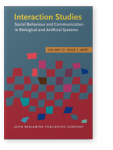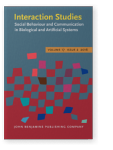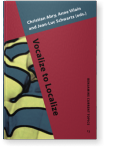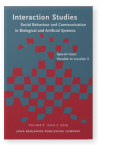Peter Ford Dominey
List of John Benjamins publications for which Peter Ford Dominey plays a role.
2016 Construals of meaning: The role of attention in robotic language production Interaction Studies 17:1, pp. 48–76 | Article
In robotics research with language-based interaction, simplifications are made, such that a given event can be described in a unique manner, where there is a direct mapping between event representations and sentences that can describe these events. However, common experience tells us that the… read more
2016 Reasoning based on consolidated real world experience acquired by a humanoid robot Interaction Studies 17:2, pp. 248–278 | Article
The development of reasoning systems exploiting expert knowledge from interactions with humans is a non-trivial problem, particularly when considering how the information can be coded in the knowledge representation. For example, in human development, the acquisition of knowledge at one level… read more
2009 Aspects of descriptive, referential and information structure in phrasal semantics: A contruction-based model Vocalize to Localize, Abry, Christian, Anne Vilain and Jean-Luc Schwartz (eds.), pp. 239–260 | Article
2005 Aspects of descriptive, referential, and information structure in phrasal semantics: A construction-based model Vocalize to Localize II, Abry, Christian, Anne Vilain and Jean-Luc Schwartz (eds.), pp. 287–310 | Article
Phrasal semantics is concerned with how the meaning of a sentence is composed both from the meaning of the constituent words, and from extra meaning contained within the structural organization of the sentence itself. In this context, grammatical constructions correspond to form-meaning mappings… read more
2003 Structure and function in sequence learning: Evidence from experimental, neuropsychological and simulation studies Attention and Implicit Learning, Jiménez, Luis (ed.), pp. 143–180 | Article
2001 Conceptual grounding in simulation studies of language acquisition The Evolution of Grounded Communication, Steels, Luc (ed.), pp. 57–85 | Article
In order to understand the evolutionary pathway to the capability for language, we must first clearly understand the functional capabilities that the child brings to the task of language acquisition. Behavioral studies provide insight into infants’ ability to extract statistical and distributional… read more





